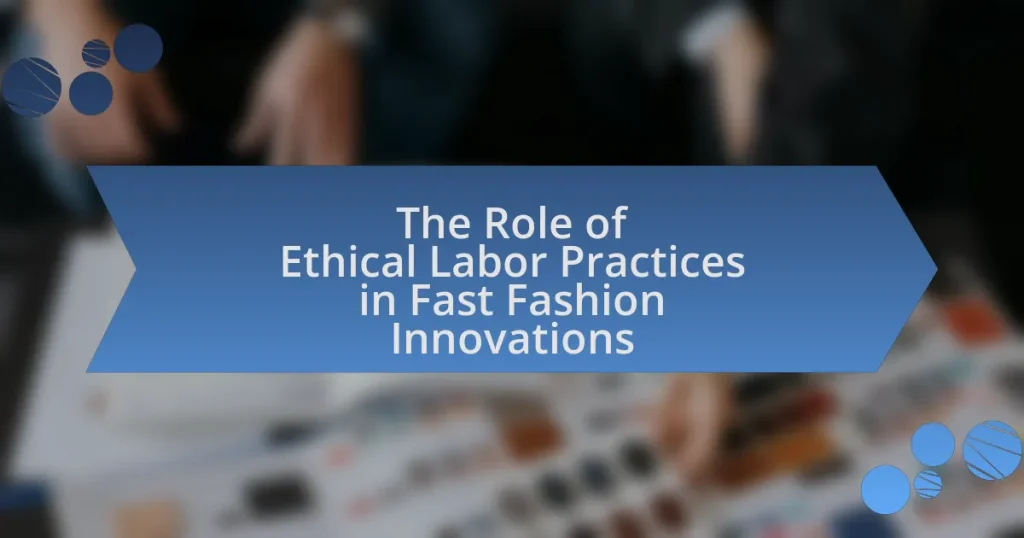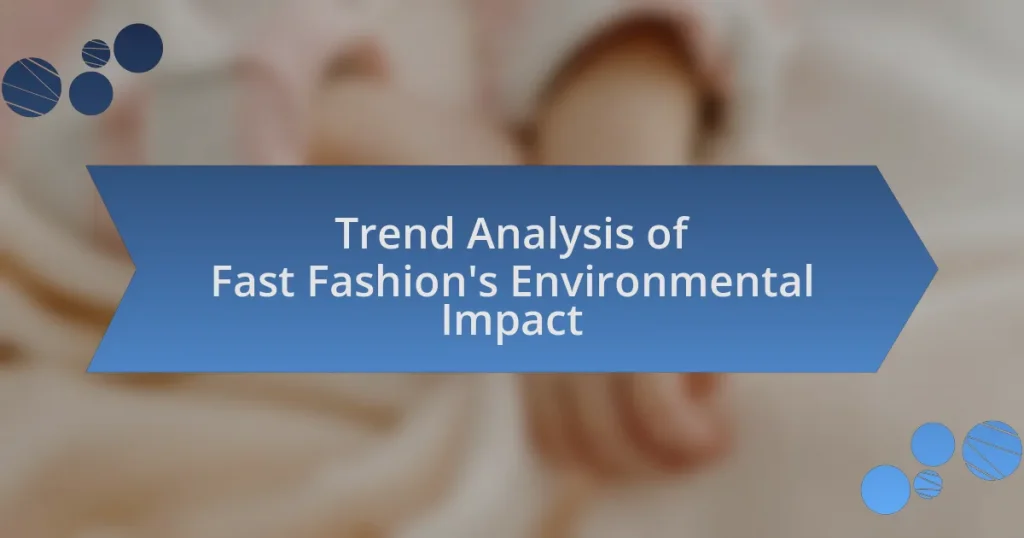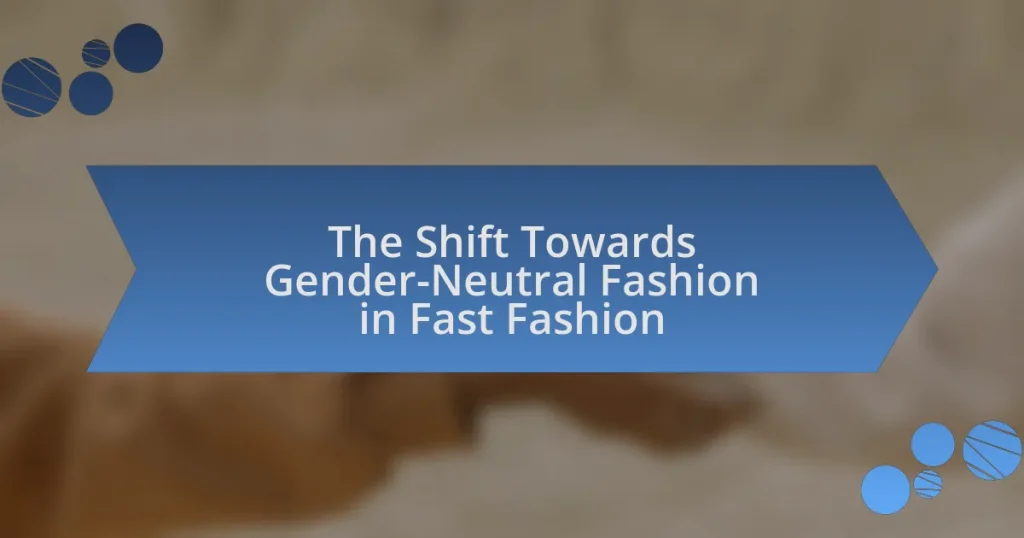The article focuses on the role of ethical labor practices in the fast fashion industry, emphasizing the importance of fair working conditions, equitable wages, and respect for workers’ rights. It outlines key principles such as safe working environments, the right to organize, and the prohibition of child labor, highlighting their impact on worker welfare and productivity. The article also discusses how ethical practices influence consumer behavior, drive brand loyalty, and foster transparency, while examining the challenges brands face in implementing these practices. Additionally, it explores emerging innovations and technologies that enhance ethical labor standards, as well as the future trends and regulatory changes shaping the fast fashion landscape.

What are Ethical Labor Practices in Fast Fashion?
Ethical labor practices in fast fashion refer to the implementation of fair working conditions, equitable wages, and respect for workers’ rights throughout the supply chain. These practices aim to ensure that employees are treated with dignity, receive a living wage, and work in safe environments. For instance, brands that adhere to ethical labor practices often conduct regular audits of their factories to ensure compliance with labor laws and standards, such as the International Labour Organization’s conventions. Additionally, companies may engage in transparent sourcing, allowing consumers to trace the origins of their garments and verify the ethical treatment of workers involved in production.
Why are Ethical Labor Practices Important in the Fast Fashion Industry?
Ethical labor practices are important in the fast fashion industry because they ensure fair treatment and safe working conditions for garment workers. The fast fashion sector often relies on low-cost labor in developing countries, where workers may face exploitation, long hours, and unsafe environments. Implementing ethical labor practices can lead to improved worker welfare, which is supported by studies showing that companies adhering to such practices experience lower turnover rates and higher productivity. For instance, a report by the Ethical Trading Initiative highlights that brands committed to ethical labor practices not only enhance their reputation but also contribute to sustainable economic growth in the communities where they operate.
What are the key principles of Ethical Labor Practices?
The key principles of Ethical Labor Practices include fair wages, safe working conditions, the right to organize, non-discrimination, and the prohibition of child and forced labor. Fair wages ensure that workers receive compensation that meets their basic needs and reflects their contributions. Safe working conditions protect employees from hazards and promote their well-being. The right to organize allows workers to form unions and advocate for their rights collectively. Non-discrimination ensures equal treatment regardless of race, gender, or other characteristics. Lastly, the prohibition of child and forced labor is essential to uphold human rights and dignity in the workplace. These principles are supported by international labor standards set by organizations such as the International Labour Organization, which emphasizes the importance of ethical practices in promoting sustainable and responsible business operations.
How do Ethical Labor Practices impact workers in the fast fashion sector?
Ethical labor practices significantly improve the working conditions and overall well-being of workers in the fast fashion sector. By implementing fair wages, safe working environments, and reasonable working hours, companies can enhance job satisfaction and reduce exploitation. For instance, a study by the Ethical Trading Initiative found that brands adhering to ethical labor standards reported lower turnover rates and higher productivity among workers. This correlation indicates that ethical practices not only benefit workers but also contribute to the sustainability and profitability of fast fashion businesses.
How do Ethical Labor Practices influence consumer behavior?
Ethical labor practices significantly influence consumer behavior by increasing brand loyalty and purchase intent among consumers who prioritize social responsibility. Research indicates that 66% of global consumers are willing to pay more for sustainable brands, reflecting a growing trend towards ethical consumption. Furthermore, a study published in the Journal of Business Research found that consumers are more likely to support brands that demonstrate fair labor practices, as these practices align with their values and ethical beliefs. This alignment fosters trust and enhances the overall brand image, leading to increased sales and customer retention in the fast fashion industry.
What role does transparency play in consumer trust?
Transparency is crucial in building consumer trust as it fosters openness and accountability between brands and their customers. When companies disclose information about their sourcing, production processes, and labor practices, consumers feel more informed and empowered to make ethical purchasing decisions. Research indicates that 94% of consumers are likely to be loyal to a brand that offers complete transparency, highlighting the direct correlation between transparency and consumer loyalty. Furthermore, brands that practice transparency are often perceived as more trustworthy, which can lead to increased customer satisfaction and long-term relationships.
How do consumers respond to brands that adopt Ethical Labor Practices?
Consumers generally respond positively to brands that adopt ethical labor practices, often demonstrating increased loyalty and willingness to pay higher prices. Research indicates that 66% of global consumers are willing to pay more for sustainable brands, reflecting a growing preference for ethical considerations in purchasing decisions. Additionally, brands that are transparent about their labor practices tend to attract a more engaged customer base, as consumers increasingly seek to align their values with their purchases. This trend is particularly evident among younger demographics, with 73% of millennials willing to spend more on sustainable products, highlighting the significant impact of ethical labor practices on consumer behavior.

What Innovations are Emerging from Ethical Labor Practices in Fast Fashion?
Innovations emerging from ethical labor practices in fast fashion include the adoption of sustainable materials, transparent supply chains, and fair labor certifications. Sustainable materials, such as organic cotton and recycled polyester, reduce environmental impact while promoting responsible sourcing. Transparent supply chains enable brands to disclose their manufacturing processes, fostering consumer trust and accountability. Fair labor certifications, like Fair Trade and Global Organic Textile Standard, ensure that workers receive fair wages and safe working conditions, which enhances brand reputation and consumer loyalty. These innovations not only address ethical concerns but also align with growing consumer demand for responsible fashion, as evidenced by a 2021 McKinsey report indicating that 67% of consumers consider sustainability when making a purchase.
How are brands integrating Ethical Labor Practices into their supply chains?
Brands are integrating Ethical Labor Practices into their supply chains by implementing comprehensive audits, establishing fair labor standards, and fostering transparency. For instance, many companies now conduct regular third-party audits to ensure compliance with labor laws and ethical standards, which helps identify and rectify labor violations. Additionally, brands are adopting codes of conduct that outline fair wages, safe working conditions, and the prohibition of child labor, thereby setting clear expectations for suppliers. Transparency initiatives, such as publishing supply chain information and engaging in stakeholder dialogues, further enhance accountability and allow consumers to make informed choices. These practices are supported by research indicating that ethical labor practices can improve brand reputation and consumer trust, ultimately leading to better business outcomes.
What technologies are being used to enhance ethical labor standards?
Technologies enhancing ethical labor standards include blockchain, artificial intelligence (AI), and mobile applications. Blockchain technology provides transparency in supply chains, allowing stakeholders to trace the origin of materials and labor conditions, thereby ensuring compliance with ethical standards. AI is utilized for monitoring labor practices, analyzing data to identify potential violations, and optimizing workforce management to promote fair treatment. Mobile applications facilitate communication between workers and management, enabling reporting of grievances and improving overall working conditions. These technologies collectively contribute to a more accountable and ethical labor environment in the fast fashion industry.
How do these innovations affect production efficiency?
Innovations in ethical labor practices significantly enhance production efficiency by streamlining workflows and improving worker satisfaction. For instance, implementing fair wages and safe working conditions leads to higher employee morale, which in turn reduces turnover rates and training costs. A study by the Ethical Trading Initiative found that companies adopting ethical labor practices experienced a 20% increase in productivity due to reduced absenteeism and improved worker engagement. Additionally, innovations such as automation and sustainable materials can optimize resource use, further increasing efficiency in production processes.
What are the challenges faced by brands implementing Ethical Labor Practices?
Brands implementing Ethical Labor Practices face significant challenges, including supply chain transparency, cost implications, and compliance with diverse regulations. Supply chain transparency is difficult due to the complexity of global sourcing, making it hard for brands to monitor labor conditions effectively. Cost implications arise as ethical practices often require higher wages and better working conditions, which can increase production costs and affect profit margins. Compliance with diverse regulations is challenging because brands must navigate varying labor laws across different countries, which can lead to inconsistencies in ethical standards. These challenges hinder the ability of brands to fully adopt and maintain ethical labor practices in the fast fashion industry.
What barriers exist in transitioning to ethical labor models?
Barriers in transitioning to ethical labor models include cost implications, supply chain complexities, and resistance from stakeholders. The financial burden of implementing ethical practices often deters companies, as they may face increased production costs and reduced profit margins. Additionally, the intricate nature of global supply chains complicates the enforcement of ethical standards, making it challenging to monitor labor practices effectively. Resistance from stakeholders, including investors and consumers who prioritize low prices over ethical considerations, further hinders the adoption of ethical labor models. According to a 2021 report by the Ethical Trading Initiative, 70% of companies cited cost as a significant barrier to implementing ethical labor practices, highlighting the financial challenges faced in this transition.
How can brands overcome resistance to change within their organizations?
Brands can overcome resistance to change within their organizations by fostering a culture of open communication and involving employees in the change process. Engaging employees through transparent discussions about the benefits of change, particularly in the context of ethical labor practices, can help alleviate fears and misconceptions. Research indicates that organizations that prioritize employee involvement in decision-making experience a 30% increase in successful change initiatives. By providing training and resources related to ethical labor practices, brands can empower employees to embrace new methods and innovations, thereby reducing resistance and enhancing overall organizational adaptability.

What is the Future of Ethical Labor Practices in Fast Fashion?
The future of ethical labor practices in fast fashion is likely to involve increased transparency, stricter regulations, and a shift towards sustainable sourcing. As consumer awareness grows, brands are pressured to adopt fair labor standards, which may lead to the implementation of technologies that track supply chains and ensure compliance with ethical guidelines. For instance, a 2021 report by the Ethical Fashion Initiative highlights that 66% of consumers are willing to pay more for sustainable products, indicating a market shift towards ethical practices. Additionally, governments and organizations are increasingly advocating for labor rights, which could result in more stringent laws governing labor conditions in the fashion industry.
How will consumer expectations shape the future of fast fashion?
Consumer expectations will significantly shape the future of fast fashion by driving brands to adopt more sustainable and ethical practices. As awareness of environmental and social issues increases, consumers are demanding transparency regarding labor conditions and the ecological impact of their purchases. A 2021 survey by McKinsey & Company found that 67% of consumers consider sustainability when making fashion purchases, indicating a clear shift towards ethical consumption. Consequently, fast fashion brands are likely to innovate by implementing ethical labor practices, such as fair wages and safe working conditions, to meet these evolving consumer demands and maintain market competitiveness.
What trends are emerging in consumer demand for ethical practices?
Emerging trends in consumer demand for ethical practices include a significant shift towards sustainability, transparency, and social responsibility in purchasing decisions. Consumers increasingly prefer brands that demonstrate ethical labor practices, such as fair wages and safe working conditions, reflecting a growing awareness of the impact of fast fashion on global labor markets. According to a 2021 survey by McKinsey & Company, 67% of consumers consider sustainability when making a purchase, indicating a strong preference for brands that prioritize ethical practices. Additionally, the rise of social media has amplified consumer voices, leading to greater accountability for brands regarding their labor practices.
How might regulatory changes impact the fast fashion industry?
Regulatory changes can significantly impact the fast fashion industry by enforcing stricter labor standards and environmental regulations. These changes may compel fast fashion brands to adopt more ethical labor practices, such as ensuring fair wages and safe working conditions, which could increase production costs. For instance, the European Union’s proposed regulations on sustainable textiles aim to reduce waste and promote circular economy principles, directly affecting how fast fashion companies operate. Additionally, compliance with new regulations may lead to a shift in consumer perception, as brands that prioritize ethical practices could gain a competitive advantage, while those that do not may face backlash and decreased sales.
What best practices can brands adopt to enhance Ethical Labor Practices?
Brands can enhance ethical labor practices by implementing transparent supply chain management. This involves conducting regular audits of suppliers to ensure compliance with labor standards, such as fair wages and safe working conditions. According to a 2020 report by the Ethical Trading Initiative, brands that engage in transparent practices are more likely to identify and rectify labor violations, leading to improved worker conditions. Additionally, brands should invest in training programs for workers to empower them and promote their rights, as evidenced by a study from the International Labour Organization, which found that training significantly increases awareness of labor rights among employees. By adopting these practices, brands can foster a more ethical labor environment in the fast fashion industry.
How can brands effectively communicate their ethical commitments to consumers?
Brands can effectively communicate their ethical commitments to consumers by utilizing transparent messaging across multiple platforms. This includes clearly outlining their ethical practices on websites, social media, and product labels, ensuring that consumers have easy access to information about labor practices, sourcing, and sustainability efforts. For instance, a study by the Ethical Consumer Research Association found that 88% of consumers are more likely to purchase from brands that provide clear information about their ethical practices. By leveraging certifications, engaging storytelling, and regular updates on progress, brands can build trust and credibility with their audience, ultimately enhancing consumer loyalty and driving sales.
What strategies can be implemented to ensure ongoing compliance with ethical standards?
To ensure ongoing compliance with ethical standards in fast fashion, companies can implement regular training programs for employees that emphasize ethical labor practices. These training sessions should cover the importance of ethical standards, the consequences of non-compliance, and practical scenarios that employees may encounter. Research indicates that organizations with comprehensive training programs see a 30% increase in compliance rates (Source: Ethics & Compliance Initiative, 2020). Additionally, establishing a robust monitoring system that includes regular audits and feedback mechanisms can help identify and address potential ethical breaches proactively. This approach not only reinforces the commitment to ethical standards but also fosters a culture of accountability within the organization.















